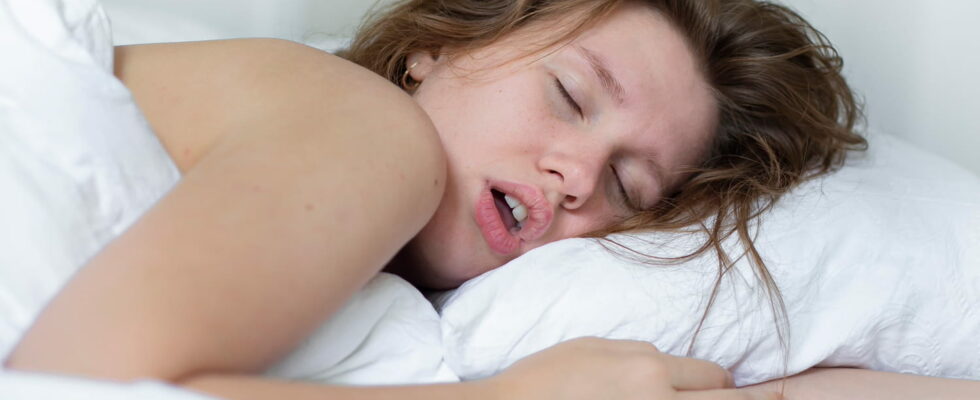When waking up from a nap or in the middle of the night, it is not uncommon to notice a trickle of drool on the corner of the lip or a halo on the pillow. However, in principle, we also swallow while sleeping, saliva should therefore be swallowed and we should not drool. So, what explains this phenomenon?
Let’s remember from the outset, saliva is essential on several levels. It plays a role in speech, digestion and protection against cavities by neutralizing viruses and bacteria. The quantity of saliva produced varies from one individual to another, typically between 500 ml and 1200 ml per day. It increases during meals to allow us to swallow food. During the night, this figure drops to 100ml. “In fact, if we drool at night, it is simply because we sleep with our mouth open. In fact, saliva production does not stop during the night, it is simply weaker. C This is the reason why we have a net and not a channel. The sleeping position (on the stomach or on the side) can also promote the evacuation of excess saliva. explains Dr Cyril Bègue, general practitioner and deputy secretary general of the College of General Medicine (CMG). Same thing if we sleep deeply: “The deeper you sleep, the more your muscles relax, so you may drool more.”
But drooling while sleeping can also be linked to more serious causes. According to an article published in the newspaper “Oral Surgery, Oral Medicine, Oral Pathology, Oral Radiology, and Endodontology“, it may be a “dysfunction in the coordination of the swallowing mechanism, which results in excessive accumulation of saliva in the anterior portion of the oral cavity and involuntary loss of saliva from the mouth”. These difficulties in swallowing are responsible for an accumulation of saliva in the mouth which flows. To treat swallowing disorders, you should consult an ENT doctor. Sleep apnea can also cause drooling while sleeping. As our interlocutor explains, “Individuals who suffer from it often sleep with their mouth open, leading to dry mouth. To counter the latter, saliva production increases and with it, the risk of drooling during sleep.. It’s the same thing when you have a cold. We breathe through our mouth which naturally increases the risk of drooling at night. Having an irritated or inflamed throat can also contribute to this phenomenon. What to do then?
As nocturnal drooling is most often benign, certain good reflexes can help to reduce it. In addition to staying well hydrated to promote swallowing, simple exercises performed alone or with a speech therapist can be beneficial. In practice, just remembering to swallow regularly is very useful. If you are really bothered, do not hesitate to talk to your doctor.
